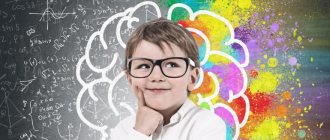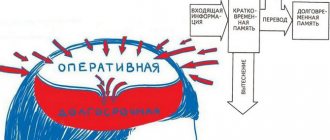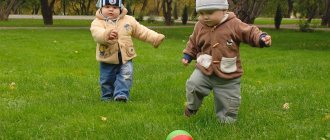Verbal-logical thinking and its development in a child. Games to stimulate the development of verbal and logical thinking.
Thinking is the highest level in a person’s mastery of knowledge of the external world. And human thinking is verbal thinking . Its formation occurs as a result of people communicating with each other, in the joint activities of an adult and a child.
One of the most important stages in the development of a child’s thinking is mastering speech . In words denoting the general aspects of the objects and phenomena of reality that children master, the decisive role is given to the child’s generalization of personal experience and the assimilation of the generalized experience of other people.
The guiding link in the development of all mental processes of a child, and first of all his cognitive activity, is speech . In the process of mastering speech, a child first learns the meanings of words heard from adults and expands his passive vocabulary. Later, an active vocabulary is formed from the words used by the child himself.
Verbal-logical thinking is one of the most complex types of thinking. It operates with complex abstract concepts, rather than with concrete images, and is expressed in words. Such thinking operates on the basis of linguistic means and is the highest stage in the development of thinking. Verbal-logical thinking occurs entirely on the internal, mental plane.
One of the important sections of speech therapy and psychology is the problem of the relationship between thinking and speech , the role of thinking in learning, communication and the development and formation of consciousness.
Recently, the number of preschoolers who have disorders of general and speech development has been growing. A large group among them are children with general speech underdevelopment.
Development of verbal and logical thinking
The formation of verbal and logical thinking occurs gradually. Mastery of the techniques of mental activity is acquired during training. At the same time, it becomes possible to act “in your head” and analyze your own reasoning process. Such operations of verbal-logical thinking as analysis, synthesis, comparison, generalization and classification are formed in the course of solving educational problems.
The child achieves his most complete, developed and perfect development in play activities. Thus, the game is an essential component of the development of verbal and logical thinking.
Thanks to play, the child develops a desire to study the world around him, a desire to influence it, a need for observation, reasoning, analysis, and drawing conclusions. This becomes possible when the child begins to make efforts and, through a situation of creative communication created by an adult, solve various problems.
In the process of developing verbal and logical thinking through play, in addition to the development of performing abilities: memory, attention, the ability to reproduce the actions of others, repeat what is seen or heard, creative abilities also develop: the ability to observe, analyze and compare, the ability to find connections, dependencies and patterns, as well as combine.
Educational games have a great influence on children's mental development. They are all aimed at ensuring that the child constantly thinks, learns to solve problems, and finds the right solutions. In addition, children develop qualities such as determination, diligence, and develop active independent activity skills.
Features of thinking in preschool age
The brain of a preschooler is mobile and malleable, open to new knowledge. That is why useful habits, the desire to engage in sports, music, theater and art are laid precisely in the preschool period.
In order for a child to analyze and think, it is necessary to constantly set new tasks for him, as well as modernize and complicate the skills he has already acquired.
There are several factors that have a strong influence on a child’s thinking:
- Circle of friends. The older the child, the more children and adults there should be around him. Kindergartens, clubs and sections help with this. The child must observe different behavior patterns of both adults and children.
- Speech development. The child learns to construct sentences and express his thoughts.
- Formation of an analytical worldview. Preschool children are characterized by paying attention to shapes, color, size, spatial arrangement and time frames.
- Acquiring skills and abilities. The child learns to retell, read syllables, and sing.
- Formation of personal qualities. Character, adaptability, initiative, organization - all this is formed as a result of educational activities.
- Formation of self-esteem. A developed child is able to evaluate himself.
- The emergence of self-control. The child learns to manage his behavior and actions.
Toys for the development of verbal and logical thinking
Educational games conceal the ability to find answers to many questions on your own. Each educational game represents a certain model of reality.
Qualitative changes in personality (development of independence, initiative, creativity, etc.) and in skills (for example, combining, guessing, modifying, etc.), which were acquired in games, can be applied in any educational and life situation.
The result of mastering educational games in preschool children is the improvement of logical thinking . Significant indicators of this are:
- children's rapid mastery of standards of measures,
- sensory standards (shape, color, size),
- skills in creating images, signs and symbols, speech,
- qualitative mastery of methods of cognition: introspection, initial skills of logical thinking and the ability to examine objects, experimentation, classification, counting and measurement, comparison and contrast.
There are many games and toys aimed at developing children's verbal and logical thinking. Here are the most successful of them, in the author’s opinion.
Simple cubes and construction sets like Lego
By using blocks in games with preschoolers, we are able to formulate important concepts in both mathematics and computer science.
These include algorithms, information coding, and logical operations. And also the ability to construct statements using conjunctions “and”, “or”, particles “not”, etc. Such games catalyze the process of development of the simplest logical structures of thinking and mathematical concepts in preschoolers.
Dienesha blocks
This is a multifunctional didactic material aimed at the intellectual and speech development of children.
Dienesh blocks are used in correctional, mixed-age, and short-stay kindergarten groups, in developmental circles for preschool children and at home.
“Logical blocks” of the Hungarian psychologist and mathematician I. Gyenes solve such problems as:
- familiarizing children with geometric shapes, ways of combining them, shape, size;
- development of mental operations: comparison, analysis, classification, generalization, abstraction, encoding and decoding of information;
- mastering basic skills of thinking algorithms;
- development of cognitive processes of perception, memory, attention, imagination.
Puzzles
This is a universal toy, and there are sets for every age. One condition - give your child a puzzle according to his abilities, and let him assemble it himself without your participation. Assembling a puzzle independently increases a child’s self-esteem and self-confidence.
Here you can print puzzles for kids.
Orbo
The Orbo ball is a simple version of the Rubik's Cube or a kind of volumetric tags. A very simple, exciting, even addictive and useful toy for children.










